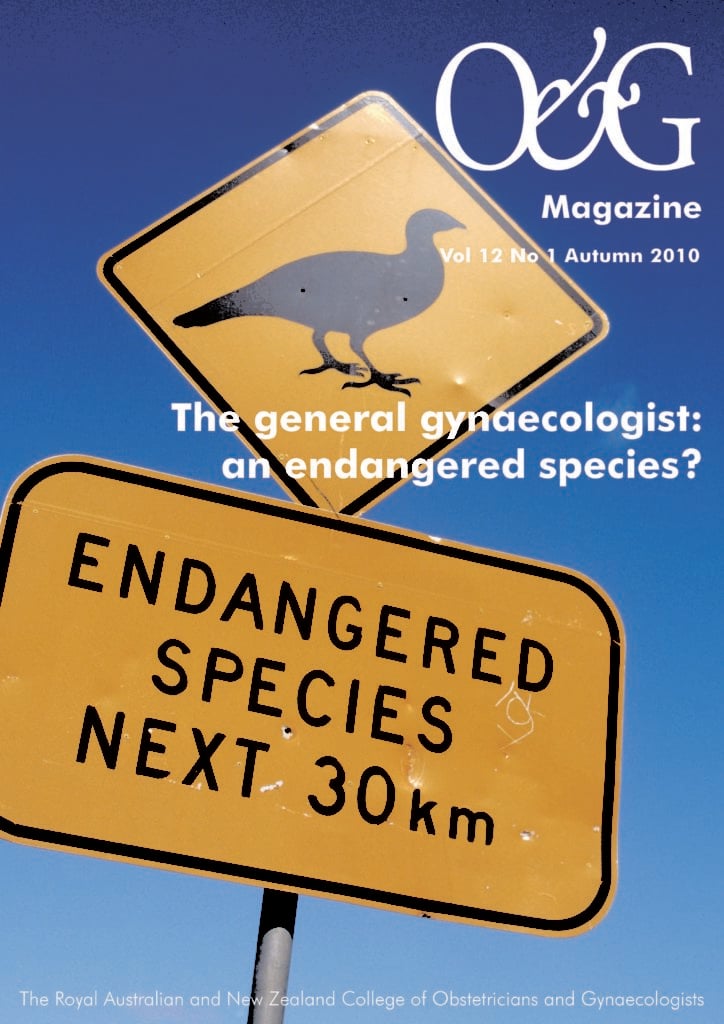Sexual health medicine is a relatively new specialty in Australia and New Zealand. In fact, the Australian Minister for Health and Ageing only signed off on our medical specialty status on 8 December 2009. As such, we join a growing list of new medical specialties such as palliative medicine, sports medicine and addiction medicine.
So, what is this new specialty of sexual health medicine? The Australasian Chapter of Sexual Health Medicine of The Royal Australasian College of Physicians has defined it (in part) as: ‘…the specialised area of medical practice concerned with healthy sexual relations, including freedom from sexually transmissible infections (STIs), unplanned pregnancy, coercion and physical or psychological discomfort associated with sexuality…The practice of sexual health medicine encompasses two perspectives: a clinical perspective and a public health approach to sexual health problems.’
We are a small but growing Chapter, currently with 152 Fellows and 19 trainees. On a day-to-day basis, most Fellows in Australia and New Zealand are employed in public settings, usually in sexual health clinics. Most of our clinical time would be spent dealing with STIs, but throughout many parts of Australia, most of the care of people with HIV/AIDS is handled by sexual health physicians. Some Fellows these days also work in the management of hepatitis B and C. In addition, many Fellows work in the field of women’s health, particularly reproductive health, but also the management of menopause. Some Fellows also work with those who have been sexually assaulted or with those women with sexual problems such as anorgasmia, vaginismus, vulval pain, chronic pelvic pain and genital dermatoses.
Other countries do not seem to have an equivalent to our specialty, although the united Kingdom has GuM (genito-urinary medicine), which is principally concerned with the management of STIs, including HIV/AIDS. Word has it that the specialty of community sexual and reproductive health is set to commence in 2011, which may well have many similarities to our discipline. Continental Europe has dermato-venereology, which is obviously more attuned to the management of genital dermatological conditions. In the united States, on the other hand, our role would be filled by gynaecologists, urologists, infectious diseases physicians, dermatologists, public health physicians, family physicians and maybe even psychiatrists! As such, Australia and New Zealand have broken new ground in having a medical specialty such as sexual health medicine. We have an excellent curriculum and training program for trainees in the specialty and a range of training posts across the two countries.
Successful training leads to the awarding of the Fellowship of the Australasian Chapter of Sexual Health Medicine (FAChSHM) of the Royal Australasian College of Physicians (RACP). In order to enter the training program, applicants must either hold Fellowship of one of the following Colleges or Faculties:
- Physicians (FRACP) – Adult Internal Medicine or Paediatrics and Child Health
- Dermatology (FACD)
- Obstetrics and Gynaecology (FRANZCOG)
- General Practice (FRACGP and FRNZCGP)
- Pathology (FRCPA)
- Psychiatry (FRANZCP)
- Public Health Medicine (FAFPHM)
- Surgery (FRACS – urology)
In the case of overseas trained specialists (including general practitioners), their qualifications must have been considered equivalent by the relevant Australasian medical college.
Another way to enter our training program is to have completed basic training of the RACP (including success in the FRACP examination). Trainees can expect that training under the supervision of the Chapter will be at least three years. Trainees who hold Fellowship of an approved college may be granted up to 12 months retrospective accreditation if the previous training and experience meets the core requirements of the training program.
A real overlap between some of the work of sexual health physicians and gynaecologists does exist and this would be most readily seen in so-called ‘office gynaecology’. Family planning and the medical (as opposed to surgical) management of women’s gynaecological health issues (including STIs, vaginal discharge and vulval dermatology) are the most obvious areas of overlap of the two specialties. Some sexual health physicians also perform colposcopies. Our Fellows, however, are physicians, not surgeons, and do not provide surgical management of gynaecological conditions. Nor are we generally involved in the care of pregnant women, except where our input is requested, such as for the management of HIV/AIDS or complicated syphilis during a pregnancy, or in the neonate.
A small number of our Fellows do have dual Fellowships in both sexual health medicine and O and G. This gives these Fellows a unique view of both fields of medicine, with some individuals choosing to maintain their work in both disciplines, in both hospitals and sexual health clinics.
Some Fellows also continue work in general practice, particularly in those practices with high caseloads of individuals with HIV/AIDS. Some of these Fellows were at the forefront of the battle against HIV in the 1980s, when the extent of this infection (particularly in the homosexual community of Australia) became horribly clear. Many of the patients were already seeing their general practitioners for regular sexual healthcare – syphilis and gonorrhoea being particularly common in the ‘pre-safe sex’ days. These GPs became very skilled in sexual health and were the natural clinicians to deal with the newly emerging AIDS presentations. Some GPs, particularly in the capital cities on the eastern seaboard of Australia, hold dual general practice and sexual health medicine Fellowships and continue to work predominantly in general practice, but with a strong sexual health focus.
The specialty of sexual health medicine has its own journal, Sexual Health, published by CSIRO Publishing. It publishes articles of original and significant research on HIV/AIDS, sexually transmissible infections, sexuality and relevant areas of reproductive health. It has grown to become an important journal in its field, with increasing numbers of submissions of a high quality. In addition, two other Fellows and I co-edited a textbook on our specialty, entitled (simply enough) Sexual Health Medicine. Its 36 chapters cover the breadth of our discipline, with a slightly expanded second edition now being prepared.
What of the future for sexual health medicine? There seems to be ongoing interest in training posts with our Chapter, so that augurs well. I would personally like to see more training posts in regional areas of Australia and New Zealand, with committed registrar positions in Indigenous sexual health. The sexual health of Aboriginal and Torres Strait Australians, and of New Zealand Maori communities, has a long way to go before catching up with the rest of the populations of our two countries. Dedicated positions in this field could do a lot to improve the situation.
At least two sexual health clinics in Australia have shown strong interest in performing medical abortions in the first trimester. Access to abortion is patchy throughout Australia and almost non-existent in parts of some Territories and States, such as Queensland. A network of sexual health clinics could provide this necessary service using mifepristone and misoprostol, providing that adequate staffing and support were provided. Sexual health physicians have all the necessary skills to take on this task, but would need the back-up of gynaecologists (and possibly GPs) to provide surgical services for the uncommon failures that may occur.
Colposcopy is provided in some parts of Australia by sexual health physicians and this is an area in which many of our trainees wish to gain more experience. Our Fellows are well-placed to provide this service in some sexual health clinics and it would be possible to take on more of the high work-load of this diagnostic and therapeutic intervention. The impact of human papillomavirus vaccination on young women, though, will have effects in the future. There may be less demand for this service in decades to come, as cervical changes due to HPV infection become less common and better testing algorithms utilising DNA testing for HPV infection become more commonplace.
As long as people continue to have sex, in all its combinations, there will be a set of consequences – most of them good, but some of them harmful. Given this, there will always be the need for medical practitioners who deal with the fall-out from sex. Sexual health medicine focuses on the potential and real negative outcomes arising from this most basic of human needs, and tries to assist people to be free of suffering arising from sex. As there is no evidence of people giving up sex at all, those of us working in sexual health medicine are likely to be kept busy for a long time to come!






Leave a Reply